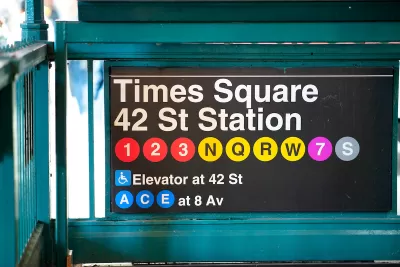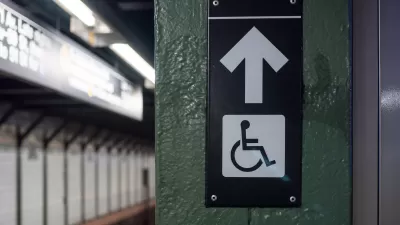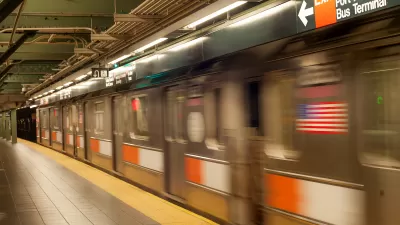The city is lagging on meeting its pledge to improve accessibility across the system.

A report from New York City’s Public Advocate reveals that “New York City’s public transit system is falling far behind other major cities both on timeline and technology needed to be truly, fully accessible,” according to a BK Reader article.
The report finds that under one-third of subway stations are accessible via elevator, with elevator outages common. “The MTA has invested significantly in aesthetic improvements that make stations less accessible, such as by removing benches and replacing them with leaning benches or that are underutilized for accessibility purposes, like using new LED screens to display advertisements instead of closed captioning for announcements.”
At the current rate of improvements, the report adds, New York City’s subway won’t be fully accessible until 2100. The report recommends immediate actions that include: implement efforts started by a 2019 pilot program, “Improve train boarding so that doors align properly with designated boarding areas, and raised infrastructure closes any large gaps between the train and platform,” and “Install wayfinding infrastructure including tactile guideways and boarding areas.” The report also provides near-term and long-term recommendations for making the city’s transit system truly fully accessible.
FULL STORY: MTA Failing to Meet Needs of NYC's Disabled on Public Transit: Report

Planetizen Federal Action Tracker
A weekly monitor of how Trump’s orders and actions are impacting planners and planning in America.

Congressman Proposes Bill to Rename DC Metro “Trump Train”
The Make Autorail Great Again Act would withhold federal funding to the system until the Washington Metropolitan Area Transit Authority (WMATA), rebrands as the Washington Metropolitan Authority for Greater Access (WMAGA).

The Simple Legislative Tool Transforming Vacant Downtowns
In California, Michigan and Georgia, an easy win is bringing dollars — and delight — back to city centers.

Albuquerque’s Microtransit: A Planner’s Answer to Food Access Gaps
New microtransit vans in Albuquerque aim to close food access gaps by linking low-income areas to grocery stores, cutting travel times by 30 percent and offering planners a scalable model for equity-focused transit.

This City Will Pay You to Meet Your Neighbors
A North Kansas City grant program offers up to $400 for residents to throw neighborhood block parties.

Commentary: Our Silence Will Not Protect Us
Keeping our heads down and our language inoffensive is not the right response to the times we’re in. Solidarity and courage is.
Urban Design for Planners 1: Software Tools
This six-course series explores essential urban design concepts using open source software and equips planners with the tools they need to participate fully in the urban design process.
Planning for Universal Design
Learn the tools for implementing Universal Design in planning regulations.
Smith Gee Studio
City of Charlotte
City of Camden Redevelopment Agency
City of Astoria
Transportation Research & Education Center (TREC) at Portland State University
US High Speed Rail Association
City of Camden Redevelopment Agency
Municipality of Princeton (NJ)




























